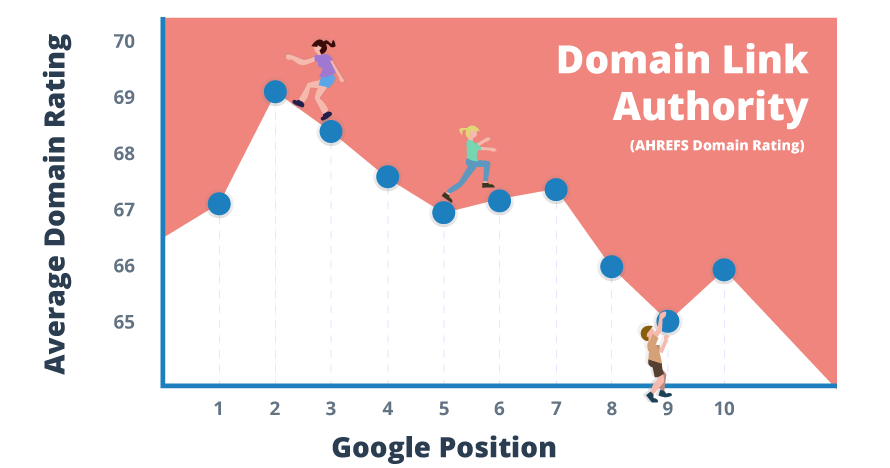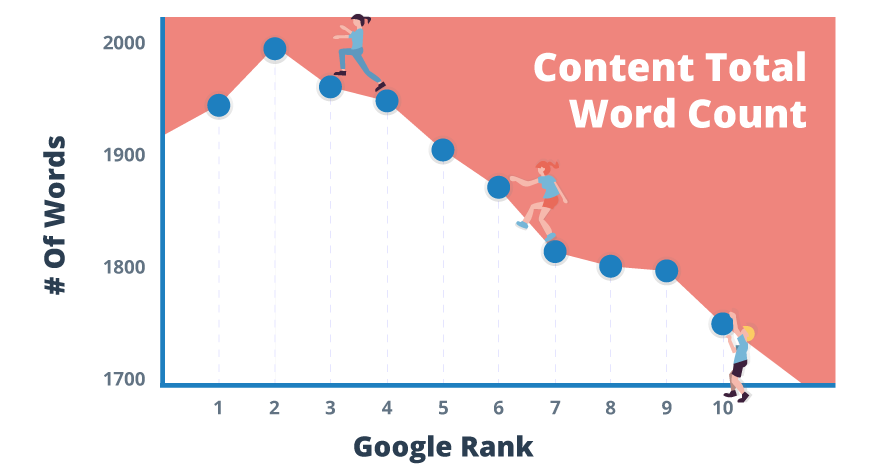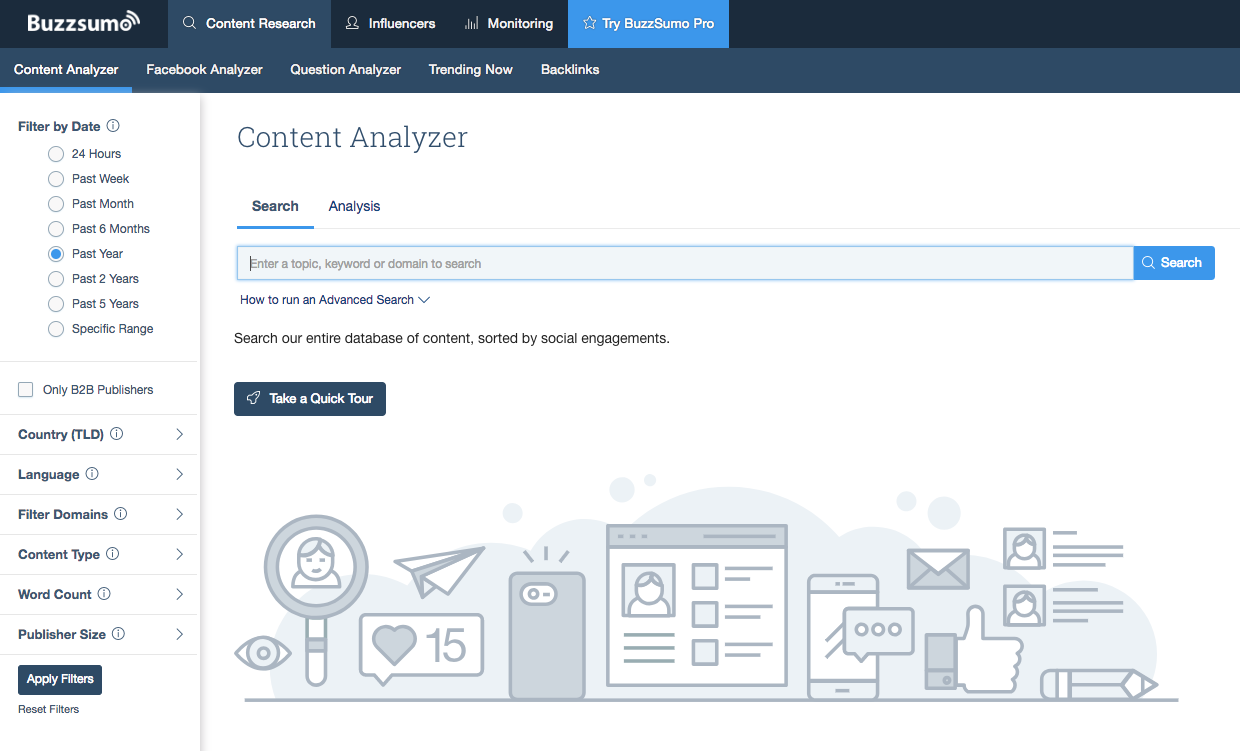Effective SEO (Search Engine Optimization) requires a well-thought-out backlink strategy in order to produce results. There are many, many moving pieces that make up a wholesome SEO strategy and backlinks are one of the biggest pieces of the puzzle.
Backlinks boost your SEO efforts, which allows you to appear higher on search engines like Google. The trick is using them properly.
What Are Backlinks?
Brian Dean of Backlinko teaches:
“Backlinks are links from other websites to your website. Search engines consider each of these links “votes” for your website and content.”
Search engines like Google use a multitude of different factors to rank websites in search. Backlinks are one of the most influential factors of them all. Backlinks educate and guide search engines.
Why Are Backlinks So Important?
Search engines learn more and more based on search queries made every day. There are 40,000 queries on Google every second. Each query helps the search engine learn how to best serve up the most valuable and relevant search results.
Google released RankBrain in late 2015. RankBrain is Google’s algorithmic learning AI system that works to find the most relevant search results possible. The internal algorithm uses backlinks to better understand websites contextually by sorting through search results and their connections to other websites.
RankBrain has only improved since its first release and is a big reason why backlinks are so important.
Backlinks aren’t going out of style anytime soon.
Google was the first search engine to consider backlinks as a ranking factor. Google’s PageRank algorithm takes into consideration how people link to a website as a way to determine the site’s overall value (or authority).
According to Google:
“PageRank works by counting the number and quality of links to a page to determine a rough estimate of how important the website is. The underlying assumption is that more important websites are likely to receive more links from other websites.”
It’s all About Authority
A site’s authority on the web is directly related to how well it will rank in search. High authority sites positively influence the PageRank or PageRating of other websites when linking to them.
Some popular, and often outdated, tactics for acquiring backlinks involve targeting a ton of low authority links. This method involves amassing a large quantity of links over finding those with quality.
In reality, the most effective approach to a powerful backlink strategy is quality over quantity.

Acquiring links from low authority directories and using the comment section of high authority sites to earn backlinks is not a strategic way to achieve results. If anything, you might end up seeing some penalties along the way for that kind of behavior.
As Google and its complex algorithms continue to expand and learn, the search engine is becoming more and more contextual. A site’s relevancy is becoming the top ranking factor when it comes to backlink.
Relevancy Matters
High authority links are great, but if the site that’s linking to you isn’t relevant to your site’s content, it won’t count for much. From Google’s perspective, a non-relevant link isn’t doing the searcher any good. It isn’t leading them on a path that’s consistent with their inquiry or what they need.
If your blog is all about home gardening and you acquire a link from a CrossFit gym, Google isn’t going to weigh this backlink with as much value as it would from a site that’s closer to your industry.
According to an Ex-Google employee from an interview back in 2012:
“…getting a link from a high PageRank page used to always be valuable, today it’s more the relevance of the site’s theme in regards to yours, relevance is the new PageRank.”
It makes sense, really. Google wants us to build links naturally. Relevancy is a clear sign of the natural flow of content and human interaction. Similar industries can learn from one another, playing on each other’s strengths and weaknesses.
Pro Tip: For even more of a link-boost, try to ensure that links to your site on other sites are embedded within the main section of the page (in the body of the content) rather than a sidebar, footer, or the comments section.
How to Get Backlinks
There are tons of ways to earn high authority, quality backlinks. Every industry is a little different, so find the methods that resonate best with you and get to work!
- Leverage Old Content
Chances are you already have some content on your blog. A fresh new look at an old post might inspire you to add something new or adapt the piece into something entirely different.
You can also utilize some competitor insights to make your article stand out from the rest. Head over to Google and search for your target keyword from the old blog post you’re working on. Check out who’s ranking in the top spots and audit their work.
Here are a few helpful questions to get the creative juices flowing:
- How many words is the content?
- Are they using any images/videos/audio?
- What’s missing? Is there something that you would have added?
- How are you different/more valuable?
Take your audit back to your old blog post and dive in with the intention of producing a better and more valuable article than anything else you’ve found on the web thus far.
Does it feel like too much work? Is what’s already out there serving the need extremely well? If that’s the case, move onto another blog post in your archives to work on and follow the same steps to find viability.
- Use Visuals as Resources
Infographics, charts, diagrams, and other visual based content are powerful resources to share with your audience. When the graphic offers value, it’s sure to be shared.
Anyone who uses your image on their site they should add a link back to you to give you credit. It’s a lot easier to get images shared more freely than a text-only blog post.
- Numbered List Posts
Create a blog post that outlines an in-depth list of actionable items related to your target keyword. Your list could be made up of tips, tricks, reasons, myths, facts, or just about anything else that you can come up with. Just make sure that your list is packed with value.
Using numbers in the title of your post is another great SEO strategy that improves click-through rate (“Top 10 Reasons Why Online Reviews Matter”). Plus, these types of posts tend to get shared a lot on social media and often earn more backlinks than other types of posts.
- Create Expansive & Educational Guides
Comprehensive content built to rank in search is the name of the game these days. I’m sure you’ve seen or experienced clickbait before. Clickbait is when you find yourself intrigued by a wild or impossible headline only to see a slideshow without text or maybe only 100 words or so. This kind of content is short-minded and extremely limited.
In fact, it’s been proven that longer content wins in search results. Google needs longer content to better understand your site contextually. Your visitors need longer content to find everything they need to know in one place.

In-depth content that’s 1,500+ words is going to rank much higher than content with less. It just isn’t possible to differentiate yourself to compete in today’s aggressive marketplace without a decent amount of space to do it in.
This speaks to the intention behind the post itself.
- Why are you writing?
- Who is the piece meant for?
- What do you hope they’ll get out of it?
The thing about SEO and backlink strategy is, you can’t with the mindset of, “I’m doing SEO.” You must forget about any requirements or rules to follow when it comes to writing your post. Think of them instead as guidelines.
Write to offer guidance, meaning, purpose, or whatever speaks to you. Write because you know that what you have to offer is going to transcend anything else on the web and that’ll it reach those who need it most.
Types of Comprehensive Content to Create:
- How To’s/Step-by-Step
- 101 Guides
- Original Research
- Podcast Transcripts
- Case Studies
- In-depth FAQ Page
- Find High Quality, Maintained Directories
Directory listings are like the new-age phone book for businesses. Directories allow you to submit your business information, usually your name, location, contact info, and sometimes a map to be showcased on the site in a catalog-like fashion. We have an article on how to claim all of your website listings on general directory sites, here.
All directory websites are not the same. There is some real opportunity in finding quality directory listing lists to submit your website to that’ll give you a quality backlink.
Sites like Pinterest, Reddit, StumbleUpon, and 1abc.org are some popular, high authority directory sites that you can add content to. You can find an exhaustive list of directory sites with their associated authority here.
- Write Testimonials
Do you have products, services, or business that you love? Are some of them related to your industry or what you have to offer? Consider writing a testimonial about your experience and share it with those companies that are most similar to you and your business for a chance to earn a variety of excellent links to your site.
Simply find the business owner’s contact information and shoot them an email with your kind words, along with a link to your website. Voila Norbert’s email finder is the go-to-tool to find the correct email address of the business owner you’re reaching out to. Make sure to let them know that you’re happy to have your testimonial shared on their website and that you’d love it if they would include a link back to you.
- Share What You’ve Got (For Free!)
Being of service to your audience is the best way to prove your worth in a competitive market space. One way you can be of service is helping those in your industry or those in similar industries to you. If you sell a product or service, offer it up for free to some influential people in your industry. Find people that have a decent size following and send them your stuff for free to try out.
Not only will this open up an opportunity to learn about someone’s experience with your offering, but it’s also likely that this person will share their experience with their own audiences with a link to your site. So now you get genuine feedback from someone who knows a lot about your industry as well as a new potential brand ambassador, like this beta tester did for WP Business Reviews.
- Find Unlinked Mentions
There are some great tools out there that’ll help you seek and find the places on the web where your website or brand is mentioned but isn’t linked to. Use Buzzsumo or Mention.com to find mentions of your brand name, your personal name, or a branded keyword.
Review the list and find any site that isn’t linking to you. Reach out to the site owner of those who aren’t linking to you (preferably sites with an acceptable authority), thank them for mentioning you, and ask for a link. Start with praise, then your request.

- Get Links from News Sites Using HARO
Using a site like HARO is a really powerful strategy when used well. HARO (Help a Reporter Out) provides journalists with a database of sources to secure valuable media coverage. Here’s the steps you’ll take to utilize HARO effectively:
- Signup as a source here: https://www.helpareporter.com/sources/
- You’ll see three emails a day from reporters looking for sources.
- If the information they’re looking for happens to be relevant to you and your blog, submit your credentials and the information from your site.
You won’t always see requests that are relevant to you but when you do and you act on them, it could end up becoming a supercharged backlink waiting for you.
Your Work Doesn’t Stop Here
Now I invite you to come and sing the song of my people: Promotion, promotion, promotion! Without spreading the news of the great work you’ve created through email lists, social media, and other initiatives, your success will be limited at best.
Share and distribute your content through email lists, social media, and any other marketing platform you possibly can.
Don’t Get Discouraged
I know what you’re thinking: “How long will it take for my backlink strategy to produce results?” The answer isn’t definitive. Annoying, I know. It’s entirely subjective to you, your business, your approach, and a lot of other factors.
So, if anyone tells you something specific like “you’ll see X number of clicks, and x% increase in organic traffic in 60 days!” you should start running.
This brings me back to my earlier point: you’re doing this work to provide VALUE, not to get clicks or conversions. Sure, those things are a nice consequence of your efforts, but it shouldn’t be your focus.
I believe that focusing on the intention behind what you’re doing transcends into your finished work. It’s felt, experienced, and appreciated – naturally. What better way to connect than through your genuine desire to support your audience?
Stay Updated on the Latest Digital Marketing News
For more digital marketing insights from the WPBR Crew, sign up for our newsletter.

